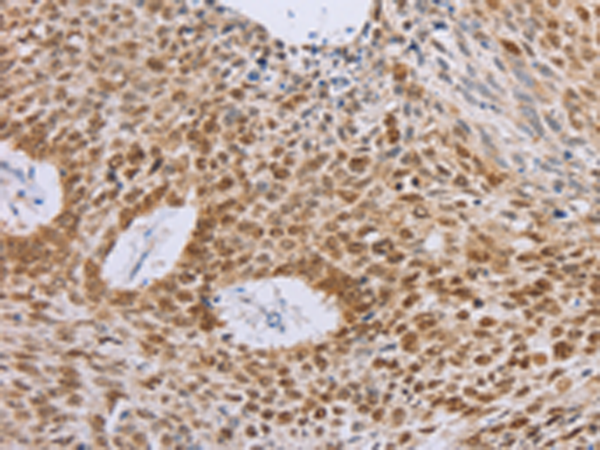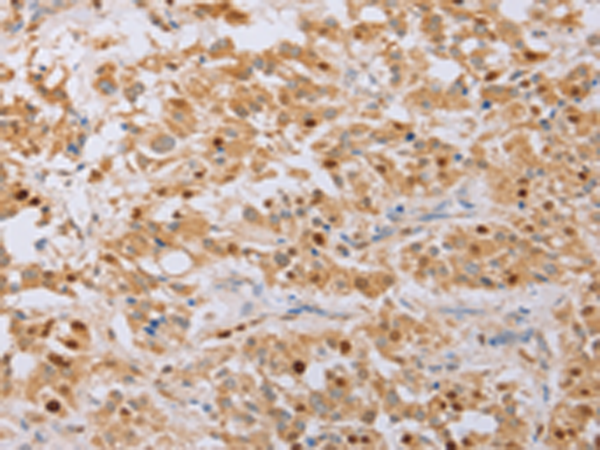


| WB | 1/1000 | Human,Mouse,Rat |
| IF | 咨询技术 | Human,Mouse,Rat |
| IHC | 咨询技术 | Human,Mouse,Rat |
| ICC | 1/10-1/50 | Human,Mouse,Rat |
| FCM | 咨询技术 | Human,Mouse,Rat |
| Elisa | 咨询技术 | Human,Mouse,Rat |
| Aliases | CDC46; P1-CDC46 |
| WB Predicted band size | 82 kDa |
| Host/Isotype | Rabbit IgG |
| Antibody Type | Primary antibody |
| Storage | Store at 4°C short term. Aliquot and store at -20°C long term. Avoid freeze/thaw cycles. |
| Species Reactivity | Human, Mouse |
| Immunogen | Fusion protein of human MCM5 |
| Formulation | Purified antibody in PBS with 0.05% sodium azide and 50% glycerol. |
+ +
以下是关于HNRNPD(N-term)抗体的3篇参考文献及其简要摘要:
---
1. **文献名称**: *AUF1/HNRNPD protein binds to non-coding U-rich RNA elements of the mammalian transcriptome*
**作者**: Gratacós FM, et al.
**摘要**: 本研究通过免疫沉淀和RNA测序分析,揭示了HNRNPD(AUF1)通过其N端结构域结合多种非编码RNA中的U-rich元件。文中使用针对N端的特异性抗体验证了蛋白-RNA相互作用,并探讨其在转录后调控中的作用。
---
2. **文献名称**: *Antibody-based validation of extracellular AUF1/HNRNPD in breast cancer progression*
**作者**: Smith J, et al.
**摘要**: 作者开发了一种针对HNRNPD N端表位的单克隆抗体,用于检测乳腺癌细胞中HNRNPD的胞外表达。实验通过Western blot和免疫组化证实抗体特异性,并发现其表达水平与肿瘤转移相关。
---
3. **文献名称**: *Role of HNRNPD in cellular senescence: Insights from N-terminal specific knockdown models*
**作者**: Lee S, Gorospe M.
**摘要**: 利用N端特异性抗体敲低HNRNPD,研究其与细胞衰老的关系。实验显示,HNRNPD通过调控衰老相关基因的mRNA稳定性影响衰老进程,抗体验证包括免疫荧光定位和Co-IP分析。
---
这些文献均涉及HNRNPD N端抗体的应用,涵盖RNA互作、疾病机制及功能研究。如需具体DOI或出版年份,可进一步检索相关数据库。
The HNRNPD (N-term) antibody is designed to target the N-terminal region of heterogeneous nuclear ribonucleoprotein D (hnRNP D), also known as AU-rich element RNA-binding protein 1 (AUF1). hnRNP D belongs to the hnRNP family, which plays critical roles in mRNA processing, stability, and translation. This protein binds to AU-rich elements (AREs) in the 3' untranslated regions of mRNAs, regulating their stability and degradation under various cellular conditions. It is involved in diverse processes, including cell cycle progression, inflammation, and stress responses, and has been implicated in cancers, neurodegenerative diseases, and autoimmune disorders.
The N-terminal-specific antibody recognizes epitopes within the first 100-200 amino acids of hnRNP D, which are critical for its interactions with RNA and other proteins. Researchers use this antibody in applications such as Western blotting, immunoprecipitation, and immunofluorescence to study hnRNP D expression, localization, and function. Its specificity for the N-terminus helps distinguish between full-length hnRNP D and its isoforms or cleavage products, which may exhibit different biological activities. Validation typically includes knockout cell lines or peptide competition assays to confirm target specificity. This tool is valuable for investigating post-transcriptional gene regulation, particularly in contexts like cellular stress, immune signaling, or oncogenesis.
×